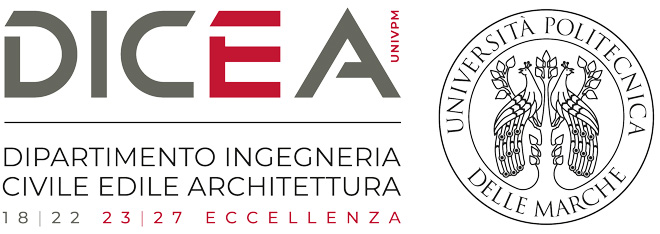DHEKALOS (Digital Heritage KALOS) is an interdisciplinary lab on Digital Cultural Heritage at DICEA UNIVPM. The laboratory drives a scientific process that spans from knowledge to the conservation and enhancement of cultural heritage, both tangible and intangible. Two closely integrated research groups cover the spectrum of competences of the laboratory: Digital Cultural Heritage (DISTORI), which deals with the digitalization of cultural heritage (3D modeling, HBIM, ICTs, Virtual, Augmented, and Mixed Reality), and Geomatics Applications & Processing (GAP), which focuses on the processing of certified geo-spatial data for environmental monitoring, landscape control, cultural heritage, and spatio-temporal dynamics (remote sensing, digital cartography, aerial and close-range digital photogrammetry, GNSS, Lidar, and SLAM integrated into data collection for the transition from GIS to CityGML).
DHEKALOS boasts national and international collaborations with public entities and institutions, such as municipalities, superintendencies, research institutes, and cultural associations.
The activities of the DHEKALOS laboratory move within the research domains of the groups that compose it, ranging from the understanding of heritage to its communication, from ideation to development.
DHEKALOS conducts studies and analyses aimed at gaining knowledge about cultural heritage in architectural, archaeological, and landscape contexts, encompassing both its material and immaterial components.

DHEKALOS deals with surveying and 3D modeling to create Digital Twins of artistic and architectural assets, landscapes, and territories, achieved through the scientific digitalization of their metric, material, and colorimetric aspects. Utilizing image-based (digital photogrammetry) and range-based (scanning systems) acquisition methods, the laboratory generates Point Clouds, 3D Models from reality-based and virtual anastilosis, spherical panoramas, and Gigapixel images.
DHEKALOS is involved in processing and managing 3D models within Databases and Information Systems for both architectural scale (BIM and HBIM) and territorial scale (GIS and CityGML).
DHEKALOS performs data processing of geo-spatial information for landscape and cultural heritage monitoring, with particular attention to the quality and statistical accuracy of the products. Furthermore, in collaboration with local companies, it experiments with solutions for measuring and monitoring user behavior in museums and cultural sites.

DHEKALOS designs, develops, and tests interactive Digital User Experiences for use and communication, based on ICTs, Virtual, Augmented, Mixed Reality, and Artificial Intelligence. It creates videos from point clouds and 3D models, holograms, virtual tours, onsite and online APPs for use, WebMuseums, and museum installations with viewers or mobile devices.
All the laboratory’s activities are closely tied to the territory and aim to collaborate with and support heritage management entities, providing assistance to museum institutions and administrative bodies. DHEKALOS is highly committed to UNIVPM’s Third Mission activities, focused on collaborations with the business world and the enhancement of researchers’ scientific endeavors, participating in numerous promotional events in the city of Ancona, the region, and nationally and internationally.

DHEKALOS is equipped with state-of-the-art instrumentation that is continuously updated.
A complete set of scanners with complementary features enables 3D scanning in static and dynamic modes: terrestrial lasers (LEICA C10, LEICA P40, and RTC360) provide extremely high-quality 3D data and HDR (High Dynamic Range) images at a remarkably fast scanning speed and considerable distances. Additionally, the Kaarta Stencil scanner is a lightweight mobile laser scanner capable of obtaining 3D point clouds quickly and with large-scale accuracy, making it suitable for integrating mapping and real-time positioning of outdoor and indoor urban or architectural areas. The Leica Scan & Go platform, with automatic bi-axial leveling and high precision, allows for 3D Laser Scanner surveys in semi-dynamic and high-altitude modes. To ensure efficiency, our measurement tools undergo annual checks and scheduled maintenance at authorized service centers.

The available metric equipment also includes a GNSS receiver (GPS Hiper HR – Base+Rover) for highly precise positioning in surveys using laser scanner or photogrammetric instruments, as well as for some mini-drones suitable for photographic, photogrammetric, and video documentation (DJI Mavic Mini Drone, DJI Spark Fly Drone).
Furthermore, a complete set for photographic and photogrammetric documentation, as well as panoramic photography (integratable with point clouds) and videos, is present. The photographic equipment is complemented by telescopic poles, stabilizers, and a lighting system that ensures perfect illumination for indoor and outdoor shots, including polarizing filters (iSTAR, Sony Alpha 9, Sony Alpha 6500, Nikon D90, Broncolor – Flash Siros 800 L Outdoor Kit 2 WiFi / RFS 2).
An extensive range of state-of-the-art devices for the development and use of virtual, augmented, and mixed reality experiences allows for research activities related to the communication of digitized cultural heritage, including tracking interactions to study user usability and satisfaction (HTC Vive VR, HTC Vive Pro Eye, HTC Vive VR Tobii Pro, iMotions-Eye Tracking Virtual Reality, NeXus-10 MKII Mind Media biometric sensors, OCULUS GO, STARK Hologram, STARK Imagewall).
Prof. Paolo Clini (scientific director)
Dr. Roberto Pierdicca (head of the laboratory)
Arch. Anna Paola Pugnaloni (technical contact)
